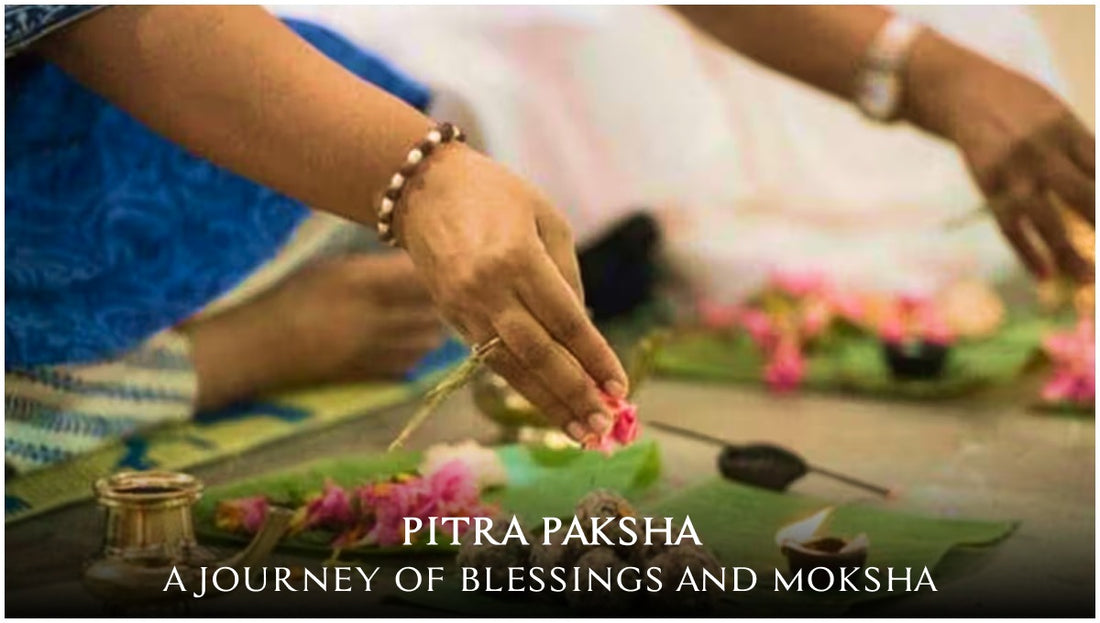The word "Pitra Paksha" comprises two words: Pitra, meaning ancestors, and Paksha, meaning phase of the moon. This 16-lunar day period is a time to pacify departed ancestors by performing rites to repay ancestral debts. During these 15 days, the Shraddha or Tarpan of ancestors is performed on the Tithi of their departure. Each day is also dedicated to the collective Tarpan of all ancestors.
Lord Krishna, in the Bhagavad Gita, says:
"For the soul, there is neither birth nor death at any time. The soul is unborn, eternal, ever-existing, and primeval. It is not slain when the body is slain."
These Pitra Paksha rituals liberate the soul from the cycle of life and death, leading it toward moksha. The Shraddha involves oblations to three preceding generations, invoking their names and the family Gotra.
The performance of these rites by the current generation helps repay debts to ancestors. It is said that ancestors (Pitrs), gods (Devas), and spirits (Pretas) bless us with health, wealth, wisdom, longevity, and eventually salvation when properly honored.
History of Pitra Paksha
The origins of Pitra Paksha traditions trace back to ancient Indian customs, with several tales highlighting its importance in Hindu culture. Two of the most notable tales are those of Bhagiratha and Karna.
The Bhagiratha story in Pitra Paksha is rooted in a curse upon his ancestors, the 60,000 sons of King Sagara. Condemned to wander due to their disrespect towards the sage Kapila, their souls found peace only when Bhagiratha, through intense penance, brought the sacred Ganga to wash over their remains, thus granting them salvation.
The story of Karna from the Mahabharata also illustrates the significance of Pitra Paksha rituals. Upon his death, Karna ascended to heaven but found that he was offered gold and jewels instead of food. When he inquired, Lord Indra explained that Karna had never performed rituals for his ancestors during his lifetime. Moved, Karna was allowed to return to Earth for 16 days to perform Shraddha rituals, which became known as Pitra Paksha.
Rituals and Traditions
During Pitra Paksha, various rituals are performed to honor the departed souls. These Pitra Paksha traditions not only elevate the ancestors' spiritual status but also invite their blessings for the living.
- Aasan Shuddhi: Purification of the seat where the rituals will be performed, symbolizing the sanctification of the space.
- Shareer Shuddhi: The purification of the body in preparation for the offerings to the ancestors.
- Pavtrikaran: Purification of water, which serves as a sacred connection to the ancestors.
- Ganga Ahvahan: Invocation of the sacred Ganga, bringing its purifying presence to the ritual space.
- Shikha Bandhan: Tying a sacred Kusha grass thread on the wrist or finger, symbolizing a connection with the ancestors.
- Swastivachan: Blessings invoked to ensure smooth conduct of the rituals.
- Shanti Paath: Prayers recited for peace and harmony for both the living and departed souls.
- Sankalp: A declaration of the individual's intent to perform the rituals in honor of specific ancestors.
- Dev Tarpan, Rishi Tarpan, and Pitra Tarpan: Oblations offered to deities, sages, and ancestors, respectively.
- Pind Daan: Offering rice balls mixed with sesame seeds and barley to sustain the departed souls. The Pind Daan importance lies in providing spiritual nourishment and ensuring peace for the souls of the departed.
- Panch Grass Rituals: Using sacred grasses to create a symbolic connection with the ancestors.
Pitra Mantra
Reciting specific mantras during the rituals invokes blessings and peace for the ancestors and the family. Here is the revered Pitra Mantra:
ॐ पितृगणाय विद्महे जगत धारिणी धीमहि तन्नो पितृः प्रचोदयात्।
ॐ देवताभ्यः पितृभ्यश्च महायोगिभ्य एव च।
नमः स्वाहायै स्वधायै नित्यमेव नमो नमः।
ॐ आद्य-भूताय विद्महे सर्व-सेव्याय धीमहि।
Reciting this mantra while performing the rituals during Pitra Paksha strengthens the bond with the ancestors and brings their blessings to the family.
Final Reflections
Pitra Paksha is an age-old tradition that emphasizes the bond between the living and their ancestors. It is a time of reflection, reverence, and remembrance, where the performance of rites and rituals helps invoke blessings for peace, prosperity, and spiritual growth.
In honoring our ancestors, we draw strength and guidance for our lives, ensuring that the thread of love, respect, and tradition continues through generations.
